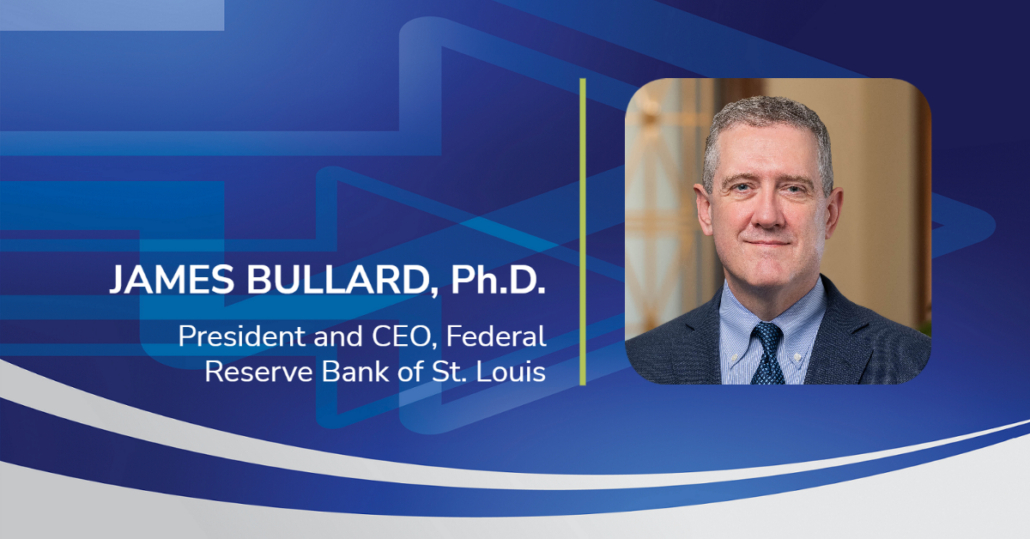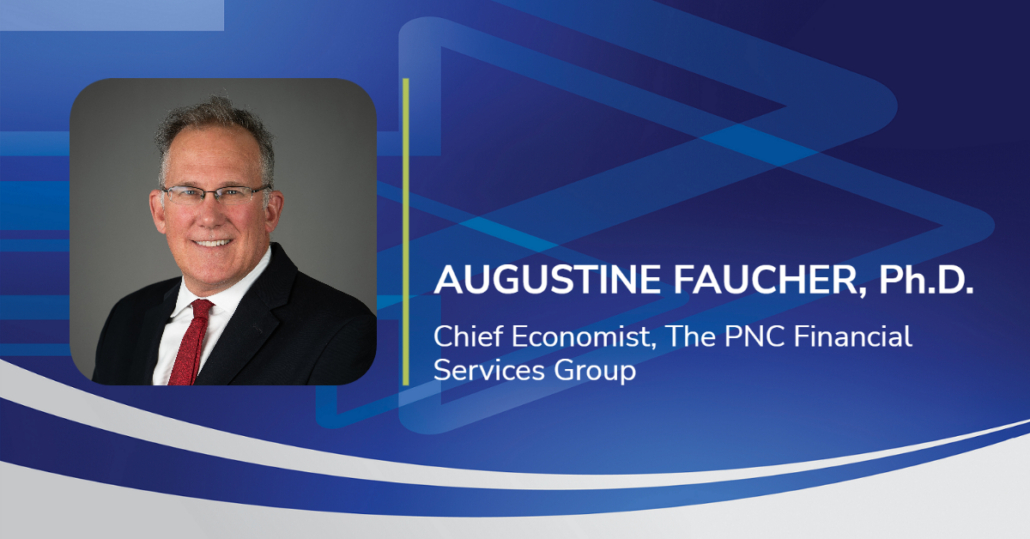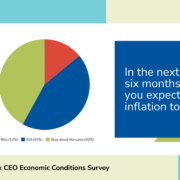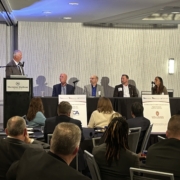Soft Landing Possible for 2023
St. Louis Fed President James Bullard and PNC Chief Economist Gus Faucher Headline Midwest Economic Forecast Forum
By Cassandra Krause
St. Louis Federal Reserve Bank President James Bullard opened the 2023 Midwest Economic Forecast Forum with bullish optimism, followed by PNC Chief Economist Gus Faucher, who offered viewers a slightly less optimistic outlook but would not rule out the possibility of a soft landing. The January 12 virtual event was hosted by the Wisconsin Bankers Association in partnership with Arkansas Bankers Association, Illinois Bankers Association, Kentucky Bankers Association, Michigan Bankers Association, Minnesota Bankers Association, Missouri Bankers Association, South Dakota Bankers Association, and the Wisconsin Bankers Foundation. BOK Financial Capital Markets, Wipfli, and the Wisconsin REALTORS® Association were event sponsors. 
An Economic Discussion with Federal Reserve Bank President James Bullard
In his opening remarks, Bullard cited above-trend GDP growth in the second half of 2022, which brought GDP growth more in line with the labor market. (The first half of 2022 saw negative GDP growth while the labor market was strong.) In addition to the GDP growth, Bullard noted other bullish factors, such as households remaining flush and bank deposits staying relatively high. While high inflation has caused consumers to spend down some of their savings, Bullard pointed to COVID dollars that provided a cushion to support consumption spending. Another factor he highlighted was that state and local governments are also relatively flush with cash from COVID dollars and tax revenue, especially from 2021.
Global Prospects Have Brightened
Bullard commented that global prospects are now better than they were even just a few weeks ago. For Europe, there is a lower possibility of recession, and the worst of the winter worries about energy prices have faded. As for China, there has been an abrupt change in COVID policies, and the economy looks to be reopening going forward. The positive developments in these two major economies, in concert with those in the U.S., indicate that global growth prospects have brightened in a short time.
That said, Bullard discussed in the Q&A that Russia is a major producer of oil and natural gas for Europe, and commodity prices have been impacted. Energy prices and commodity prices feed through to other aspects of pricing, so it is not easy to disentangle the energy crisis from other crises. While he hopes that a resolution in the conflict in Ukraine can be reached, he acknowledged that it remains an extremely dangerous situation that is likely to persist for some time. He noted that in some cases of wars that have gone on for some time in history, markets have adjusted to that equilibrium, and that has happened to some degree with Russia’s war in Ukraine.
Shipping from China went up in cost during the pandemic and has come down dramatically, mitigating supply chain issues. American businesses are astute at finding workarounds or even changing their product, Bullard said, so that they aren’t as reliant on particular parts from a specific area. He also said that businesses are moving away from “just in time” to “just in case” inventory strategizing, so they’re not overly reliant. Additionally, he pointed out that the Russian invasion of Ukraine has sensitized people to geopolitical issues, so they understand that global supply chains are not as reliable as they may have been in previous decades.
Fed President Bullard Favors Front-loaded U.S. Monetary Policy
With 1.7 job openings for every unemployed worker in the U.S., Bullard said it is hard to see how unemployment would go up. Meanwhile, unemployment insurance claims remain low, and workers feel confident they can quit their jobs and go to another job.
Though the December 2022 inflation rate of 5.7% (all items, less food and energy) is well above the target of 2%, Bullard told Forum viewers it is moderating in response to the front-loaded and aggressive monetary policy in 2022. He maintained that the Fed’s policy has been the right one and that the repeated return of inflation — as experienced in the 1970s — can be avoided by maintaining rates at high enough levels and not dragging things out into 2023.
During the Q&A session, Bullard said that the fact that M2 growth has collapsed bodes well for disinflation prospects in 2023. While it’s a good sign, he said the correlation between M2 growth and inflation is not strong enough to rely on solely as a policy basis.
If inflation does not moderate as quickly as markets are hoping for, he said the Fed would have to react. His preference would be to get above 5% interest rates as soon as possible to put downward pressure on inflation.
Bullard’s 2023 Outlook
When asked which sectors are under the greatest recessionary pressure in 2023, Bullard responded that the sector most impacted by rate increases has been housing. He noted that the housing market started reacting “before the Fed had barely done anything.” Markets anticipate policy, said Bullard, and this has real effects on the ground before the policy move is made.
Looking at the overall picture, Bullard said that recession risks have diminished some in the last 90 days, Q4 2022 was stronger than expected, unemployment is down, and jobs are up, all of which signal that prospects for a “soft landing” — a period of slowed growth to bring inflation down but without going into recession — have improved. He concluded by saying, “so far so good, and let’s hope that’s the outcome for 2023.” 
Recession Risks Elevated in 2023 as Fed Raises Interest Rates to Fight Inflation – Augustine (Gus) Faucher
In a slightly less optimistic perspective, PNC’s Faucher told Forum viewers that a mild recession is likely in 2023. He said the biggest problem is employers not being able to hire. While the U.S. economy is expanding and small businesses view their prospects optimistically over the next six months, Faucher pointed to concerns of rising interest rates and the expectation that the Fed funds rate will continue to increase. Another factor Faucher cited was volatility in stock prices, which is currently higher than it was in 2021 but lower than it was in 2020.
Yield Curve Has Inverted
In his overview, Faucher noted that employment levels have fully recovered from the pandemic and economic activity is now above the pre-pandemic peak. At the same time, consumer spending on services lags and, though consumer spending on durable goods is above pre-pandemic levels, that will decline as interest rates make it more expensive to borrow for items like cars, said Faucher. Similarly, he predicted that with higher interest rates, consumers will continue cutting back in the residential real estate market in 2023. Faucher also noted that exports are up slightly from pre-pandemic levels and imports are up; noting that the economy wasn’t ready to support the influx in demand for imported goods during the pandemic.
A metric Faucher is paying close attention to is the yield curve. He said that when the yield curve inverts, a recession typically follows 6–9 months later, so there’s a good indicator that a recession is coming in the 2023 U.S. economy.
He illustrated the difference between the yield on a 10-year Treasury (long-term security) and a 3-month Treasury (short-term security). Normally long-term rates are above short-term rates because lending for a longer period of time involves taking on more risk. Because long-term rates have gone up somewhat and short-term rates have gone up even more, an inversion in the yield curve has resulted.
He expects the yield curve to invert further following upcoming Fed meetings in early February and mid-March. He said a deep inversion reflects not just what the Fed is doing, but also reflects market sentiment.
Faucher Predicts Milder Effects Than in Previous Recessions
Faucher predicts a 2023 recession will be more like the recessions of the early 1990s or the early years of this century and not as severe as the Great Recession or the Viral Recession. Reasons Faucher cited for a milder recession are:
- Consumers are positioned to weather a recession relatively well. Many homeowners refinanced at lower rates and many consumers still have a good personal savings rate, though high inflation has hit low-income households especially hard.
- Employers will be reluctant to lay off workers because it will be harder to rehire when the economy picks up, in part due to the accelerated retirement of baby boomers during the pandemic.
- The housing market is in “decent shape.” The housing market has been undersupplied for years, and factors like sub-prime loans that contributed to the Great Recession are no longer present.
- Delinquency rates are extremely low. Though credit quality would likely deteriorate with a recession in 2023, banks are well capitalized and can withstand higher losses in that scenario.
Recession Not Guaranteed
Faucher does not think recession is inevitable, listing open questions, including Ukraine and China.
On a regional level, he highlighted that the Midwest has more affordable housing than other regions and that people with greater flexibility for remote work may take advantage. If people have to go to the office, however, this migration to the Midwest might suffer. Faucher said it’s a question of whether people continue moving inland from coastal cities and to more suburban or rural areas from larger cities.
In 2020, every area of the country saw economic contraction, whereas in November 2022, data from the Federal Reserve Bank of Philadelphia showed most of the country in expansion. Faucher also pointed to Midwest employment being almost back to pre-recession levels. He said that weak demographics are the Midwest’s biggest problem in the long run: slow population growth makes it difficult to find new workers, which encourages businesses to move elsewhere.
Overall, Faucher gives it about a 1 in 3 chance that the Fed manages to pull off a soft landing in 2023.
If you were unable to attend the live broadcast, you may still contact wbaeducation@wisbank.com to register to receive access to the recording and materials through January 26, 2023.
Wisconsin Experts Offer Sector Forecasts
As an extension of the Midwest Economic Forecast Forum, WBA has compiled eight sector-specific reports from industry experts on what 2023 will hold for Wisconsin. The reports include insights from Rose Oswald Poels, Wisconsin Bankers Association; Robb Kahl, Construction Business Group; Kevin Krentz, Wisconsin Farm Bureau Federation; Brandon Scholz, Wisconsin Grocers Association; Eric Borgerding, Wisconsin Hospital Association; Kurt Bauer, Wisconsin Manufacturers & Commerce; Michael Theo, Wisconsin Realtors Association; and Tom Still, Wisconsin Technology Council.
To read the full Wisconsin Economic Report, please visit wisbank.com/2023forecast.









